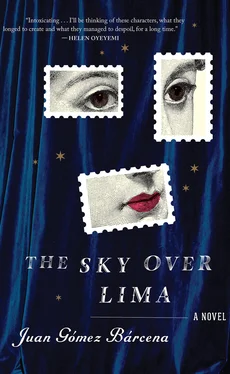He feels almost the same desperation now as he pushes aside the bundle of letters. He feels deep repugnance, something he cannot express in words (but the Professor says that if there are no words, then the inexpressible thing is nothing), and he understands at last, or at least he thinks he does. It is a longing for everything to be over, to declare that Georgina is dying.
That’s what he thinks: Georgina has to die.
Actually, he says it out loud.
“We have to kill her.”
And José turns to look at him and laughs. A long, exaggerated guffaw that breaks off as Carlos’s meaning dawns on him.
“Kill whom?”
Then José tries to object, to say anything at all, but Carlos rushes on. His voice does not sound like his voice; indeed, it no longer is his voice. It sounds a bit like José’s, but it’s not that either. It sounds like, and in fact is, the authoritarian voice of Román: a voice that demands deference and quiets José in an instant. It is rather amusing to hear Román say that an imaginary friend must be killed — but really it isn’t amusing at all. It is true.
Is it true?
Carlos seems quite sure of himself. As if Román had lent him not just his voice but also his confidence, that determination with which he used to play pranks or declare the rules of a game. As he talks, only the slightest gesture reveals the emotion he’s feeling: the way his fingers are fiddling with the edges of the bundle of letters. It is as if he could go forward and backward in time at will, returning to the novel to select just the scenes and examples to buttress his words. He says: Weren’t you the one who insisted that all of this was just literature? The one who quoted Aristotle and talked about verisimilitude? The one who kept saying our novel’s ending needed a bit of drama, because the best love stories always end in tragedy? That Petrarch had to have a woman die on him, and Dante a girl, and Catullus a young man, so that a great poem could be written. Isn’t that what you said, José? Well, there’s your tragedy — Anna Karenina throwing herself under a train, María clenched with epilepsy, Fortunata bleeding to death, Emma Bovary swallowing arsenic. Because Georgina has consumption, don’t you see? She has two cavities in her lungs as large as fists. How else can you explain her pallor, her seclusion, and the way the housemaid would scold her when she spent evenings in the garden watching the moths burning up in the lamp — don’t you remember, José? And the cough racking the chest and the urgent admission to the Santa Águeda sanatorium — a surprising choice of disease, really. “I never said it was Santa Águeda!” José sputters. That hardly matters now, Carlos continues, the main thing is there’s only one sanatorium in La Punta, and that sanatorium is for consumptives — Juan Ramón can confirm it if he wishes. You wanted me to help you, and this is all the help I can offer: I’m just a reader of your novel, and as such I know that this story has to end with Georgina dead and Juan Ramón in mourning.
Can it really be true?
José sighs. All right, he says. Carlos may very well be correct in what he’s said, at least about part of it; José is even willing to accept that he might be correct about everything. Lately the novel has been hurtling toward a tragic end, and that could be his fault. But surely there is still something they can do; even if we aren’t the authors, let’s get on with it, damn it, who else can write an alternative ending? One where Georgina does not die but they still find a way to keep Juan Ramón from boarding that ship, to make him write a poem instead.
Hearing José’s insistence, Carlos smiles with a new expression. He has practiced it in front of the mirror many times, and at last he has the chance to use it: a look of superiority, of disdain. Of course you can do that if you like, he answers. Save her on the very last page, like in those flea-market novels that always end with an unexpected pardon from the Crown. Or the discovery of a hidden treasure. Or a mounted charge against the enemy’s rear guard, led by a general who’s never even been mentioned before. That’s called deus ex machina, is it not? Well, there you go, then: perform a deus ex machina if that’s what you want, and the hell with your novel — and the poem too. Have you forgotten about the poem? What will the Maestro write if Georgina survives? A few trifling verses that no one will even notice, guaranteed — an inconsequential lament for yet another maiden who became a nun or was forced to marry. Worse still: a poem about two scoundrels pretending to be a woman. And why should José be satisfied with that when he could have a poem that aches with real grief, a true and inconsolable wail; an elegy for a beloved who has died, snuffed out on the very eve of this long-anticipated encounter, maybe for no other reason than that such a beautiful flower simply could not last. But if he’s not convinced, he can go for it. If he’d rather have a tacky junk-shop novel, the kind that’s sold at a nickel a pound, then he knows what he has to write. Or he could just sit back and let Juan Ramón come to him; he and Georgina can get married and have paper children, for all Carlos cares.
Here Carlos pauses; he lights a cigarette. His hands are shaking, but this time it’s not out of unease or trepidation. He feels a wild exultation, a furious euphoria that has driven him to his feet and inspired him to spit out those last words. It is a new emotion, or at least it seems new at first, but slowly he realizes that it also leaves a familiar aftertaste. He experienced something similar once before — he’s just remembered. It was eight years ago, in the Polish prostitute’s bed. Because if he’s honest with himself, he has to admit that back then he felt more than just guilt and sadness, even if it is those emotions that have prevailed in his memory for all these years. When he awoke and saw the bloodstained sheets, he also felt, he remembers now, a more primitive pleasure that he didn’t understand at the time. A sort of arousal tinged with the same frenzy his father used to exhibit when he beat their indigenous workers, and perhaps too with the pleasure that he himself had secretly enjoyed as he moved repeatedly over the young girl’s body. Her cries like a sweet anesthetic in his ear, like a thermometer measuring his valor, his strength. The knowledge that, in spite of everything, he too could inflict pain. That he could dominate and destroy another human being and then simply leave, nonchalant. And now the same exhilaration washes over him, a furious elation that would destroy everything, as if the blood on that sheet belonged not to the Polish prostitute but to tubercular Georgina — the red sputum that she will keep coughing up till she breathes her last, just because he wishes it to be so.
José vacillates. He doesn’t speak immediately. In the glow from the stove, his face is full of oscillations, of flickering dark shadows and red light. But Carlos doesn’t need to hear what he’s about to say. He knows that his hesitation is only a mirage — that in fact the decision has already been made, just as Román always knew that his friend Carlos would end up accommodating all his desires. It cannot be otherwise. And so he takes another drag on his cigarette, and as he does, he seems to anticipate everything that will follow: His father bribing the consul, or even the Peruvian ambassador to Madrid ( Tell me, you leeches, how much this poet’s heart is going to cost me ); if necessary, forging a death certificate for Georgina, just as he previously invented the records of all those illustrious ancestors. Georgina’s death contained in the space of a telegram, because her final words will journey not in the hold of a ship but in a diplomatic cable. Thirteen words, to be exact, the maximum allowed in urgent messages, and he and José scrawling on sheets of paper, crumpling them up until they find the right ones. Thirteen words, perhaps something like these: Please inform poet Juan Ramón Jiménez that Señorita Georgina Hübner of Lima is dead —“That’s fourteen,” the telegraph operator will point out, and Carlos, after thinking a moment: “Then cross out the poet bit.” And the telegram, without the word poet , traveling across the ocean as Georgina dies in a tuberculosis hospital — or, better still, Georgina dying and in her delirium dreaming of a telegram that travels across the ocean; the nuns coming and going with their white wimples and surgical trays and cold compresses; electric pulses rattling down thousands of miles of undersea cable, invisible as a dream; Georgina awake, in the throes of death, and behind her eyes a telegram soaring over ocean ridges and shipwrecks, seaweed forests and mud flats, shelves and trenches briefly illuminated by a feverish lucidity; her nightmare spinning the telegraph bobbin, the inked roller, the strip of paper that is filling up with words, with silences, with dots and dashes so much like her broken breathing. The nun’s hand reaching out to close her eyelids, and the strip of paper in the hands of the telegraph operator, in the hands of the messenger boy, in the hands of the guard, of the servant, of Juan Ramón at last; once more his fingers unrolling the telegram, his hands steady at first, though soon they begin to tremble.
Читать дальше












